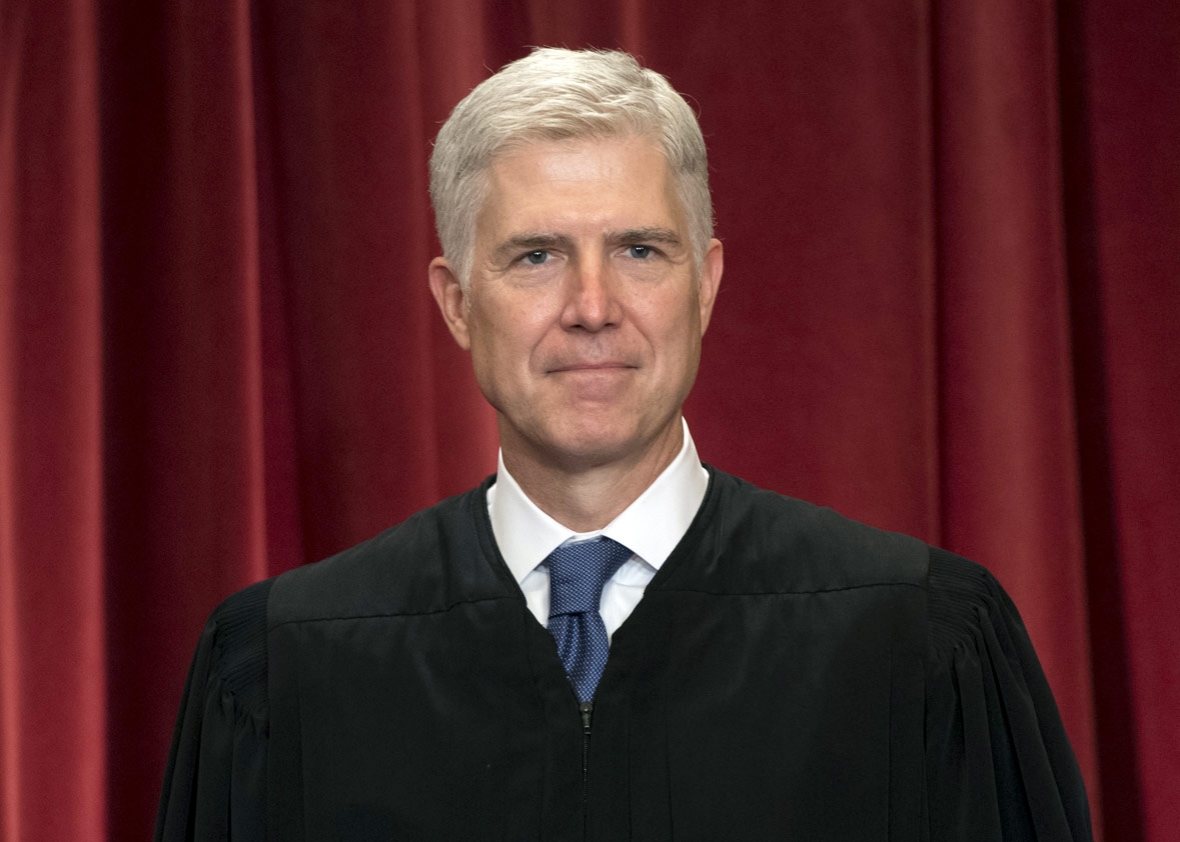Supreme Court Breakfast Table
Entry 13: Neil Gorsuch is everything liberals feared—and more.

Saul Loeb/AFP/Getty Images
On Monday, Justice Neil Gorsuch revealed himself to be everything that liberals had most feared: pro-gun, pro–travel ban, anti-gay, anti–church/state separation. He is certainly more conservative than Justice Samuel Alito and possibly to the right of Justice Clarence Thomas. He is an uncompromising reactionary and an unmitigated disaster for the progressive constitutional project. And he will likely serve on the court for at least three more decades.
Although Gorsuch has barely been on the bench for two months, he has already had an opportunity to weigh in on some of the most pressing constitutional issues of our time. In each case, he has chosen the most conservative position. On Monday, Gorsuch indicated that he opposes equal rights for same-sex couples, dissenting from a ruling that requires states to list same-sex parents on birth certificates. (Justices Clarence Thomas and Samuel Alito joined his dissent.) That, alone, is startling: In Obergefell v. Hodges, the court held that the Constitution compels states to grant same-sex couples “the constellation” of “rights, benefits, and responsibilities” that “the states have linked to marriage,” including “birth and death certificates.” Obergefell, then, already settled this issue. Gorsuch’s dissent suggests he may not accept Obergefell as settled law and may instead seek to undermine or reverse it.
Want to listen to this article out loud? Hear it on Slate Voice.
Get Slate Voice, the spoken edition of the magazine, made exclusively for Slate Plus members. In addition to this article, you’ll hear a daily selection of our best stories, handpicked by our editors and voiced by professional narrators.
Start your free 2-week trialTo listen to an audio recording of this article, copy this link and add it to your podcast app:
For full instructions see the Slate Plus podcasts FAQ.
Gorsuch also joined Thomas in dissenting from the court’s refusal to review a challenge to California’s concealed carry laws. California grants concealed carry permits for “good cause”—namely, a “particularized need, substantiated by documentary evidence, to carry a firearm for self-defense.” Gun advocates challenged this rule, alleging a violation of the Second Amendment. But the 9th U.S. Circuit Court of Appeals upheld the California regime, and on Monday, the court declined to reconsider its decision. Thomas and Gorsuch dissented vociferously, essentially declaring that the Second Amendment grants individuals a right to carry loaded firearms in public. Not even the archconservative Alito joined their bizarre opinion. It appears Gorsuch is eager to strike down almost any law that limits the right “to keep and bear arms” in any way. If adopted by the court, Gorsuch’s theory would effectively bar state and local governments from passing almost any kind of gun safety legislation.
Monday also revealed Gorsuch’s deep hostility to the separation of church and state. He joined Chief Justice John Roberts’ opinion for the court in Trinity Lutheran v. Comer, holding that a state may not constitutionally refuse to subsidize houses of worship. The court, joined by Gorsuch, held that, when a state declines to fund a church’s improvement project, it somehow violates the Free Exercise Clause of the First Amendment. As Justice Sonia Sotomayor noted in her vehement and impressive dissent, Roberts’ opinion held “for the first time” that “the Constitution requires the government to provide public funds directly to a church.” Roberts’ decision is especially noteworthy for its complete rejection of originalism: As Sotomayor painstakingly proved, the United States has a rich history of laws preventing the government from “directing taxpayer funds to houses of worship.” Never before has the court found that these laws somehow interfere with the free exercise of religion.
Gorsuch joined Roberts’ opinion, although he parted ways with the chief justice when it came to a critical footnote that limited its holding. Trinity Lutheran involved playground resurfacing: The church wanted a state grant for a special rubber substance it wished to pour onto its play area. In a footnote, Roberts wrote that “this case involves express discrimination based on religious identity with respect to playground resurfacing. We do not address religious uses of funding or other forms of discrimination.” (Emphasis mine.) Gorsuch, as well as Thomas, rejected this footnote; both justices wrote separately to declare that they’d go further, holding that any disparate treatment of religious organizations likely runs afoul of the Constitution. That seemingly benign statement implies that both justices would force states to funnel more taxpayer money to churches and religious groups. To their minds, the government discriminates against religion when it refuses to subsidize it.
Then, finally, there’s the travel ban ruling. In a compromise decision, the justices allowed Trump’s executive order to take effect but exempted “foreign nationals who have a credible claim of a bona fide relationship with a person or entity in the United States.” The order gives the Trump administration most of what it wants, while ensuring that individuals with significant ties to the U.S. will not be turned away at the border. Yet Gorsuch, joined by Thomas and Alito, opposed this compromise: He would’ve let the travel ban take effect in its entirety, as he believes it to be lawful. So much for the fantasy of Gorsuch standing up to Trump.
When Trump first nominated Gorsuch, I was relieved he hadn’t picked an outright lunatic, and I felt cautiously optimistic that Gorsuch might be less of a hard-line conservative than liberals believed. I was wrong. Gorsuch is the worst kind of justice. He is a reactionary who dresses up his cruel, antediluvian views in folksy charm; who professes restraint while espousing extreme, sweeping views; who has no sympathy for vulnerable minorities but believes Christians are being oppressed. And he will guide the course of the law for the next 30 years or more. He is a catastrophe for proponents of civil rights and equal justice. And his influence over the court only stands to grow.
This country is in terrible trouble.
